The hope of creating a reliable “vaccine passport” started in April of 2020. In theory, it would be a document that showed whether you’ve been vaccinated, and are therefore (most likely) immune to the current strains of the novel coronavirus. The questions everyone is asking are: Who will be in charge of making the vaccine passports? Who will accept them? How will people get one? And how do we prevent people from making counterfeits?
Sadly, the answers are not clear. Like all things during the COVID-19 pandemic, the process of creating a universal, efficient vaccine passport is going to challenging. Here’s what we know right now:

For starters, in the USA, people receiving the vaccine also get a small white card issued by the CDC. The card states which vaccine you’ve had, who gave it to you, and whether you’ve only had one dose or two. It’s a good start to monitoring vaccinations, but it’s also filled with issues. The main one being the fact that it’s a piece of paper with each doctor writing their own signature, meaning it’s easy to reprint and very hard to determine whether a signature is legitimate or forged.
Making matters more confusing is the fact that various entities are creating their own vaccination passports, which means competing technologies, difficulties knowing who will accept which, and complications in discerning the validity of each platform. The two main passports being developed are both digital, intended to be used on a smartphone (which poses its own problem: what if someone doesn’t own a smartphone?)
The first vaccine passport being created is the Travel Pass by the airline group, IATA. The app will allow travelers to find nearby testing facilities, upload test/vaccination results, and display them to travel officials. In theory, it’s a good idea. However, the app is still being designed and isn’t yet operational. Secondly, once the app is made, it will have to be tested and verified by governments all over the world before it can be accepted globally (which will be necessary for an app designed to help people travel internationally.)
The second app being developed is the Common Pass. This app will allow travelers to upload COVID testing and vaccination documents, and will notify them if their information will be accepted by the destination they’re planning to visit. Again, this app is still in development and isn’t yet available in the app store. However, it’s much further along than the IATA app is.
Complicating things even further is the fact some nations are trying to create their own digital passports. Both Sweden and Denmark have announced that they’re going to create digital vaccination sheets that won’t just be used at airports, but could potentially be used to enter large gatherings like sporting events.
So, the road ahead is going to be tricky. It’s going to be a competition of various technologies and ideas. There won’t be any singular, universal, easy-to-use vaccination passport anytime soon. However, the gears are turning. Vaccinations are being distributed (although much slower than hoped) and a dim light can finally be seen at the end of the tunnel.


